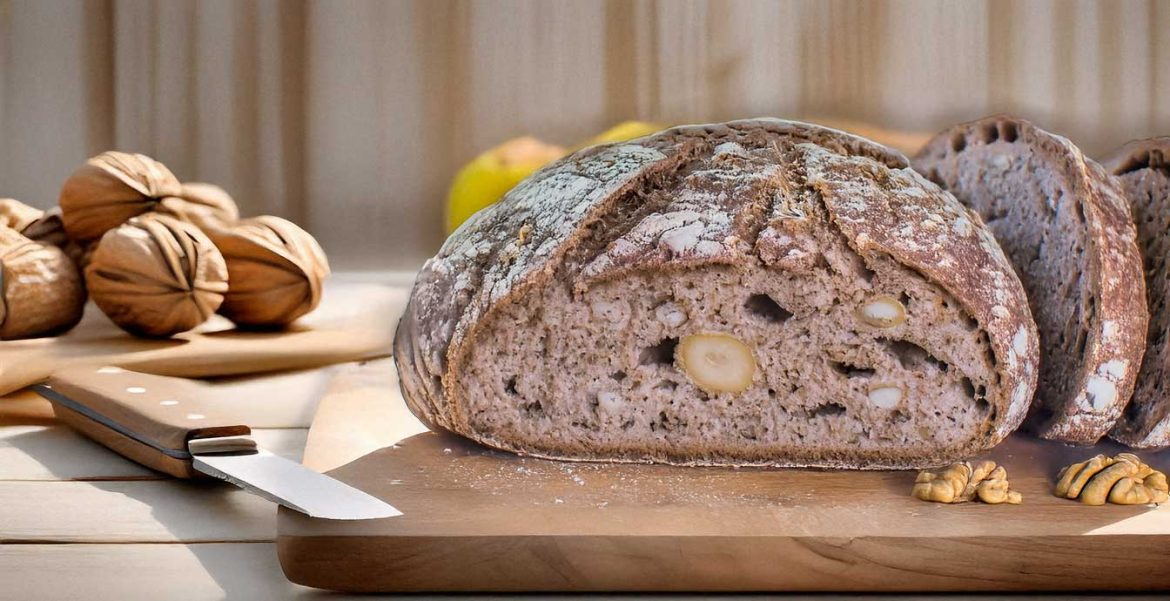Walnut Bread – A Rustic Delight for Every Occasion
There’s something undeniably comforting about the aroma of freshly baked bread wafting through the house. And when that bread is filled with the rich, nutty flavor of walnuts, it becomes a treat for the senses. Walnut bread isn’t just food – it’s an experience, a rustic delight that pairs perfectly with cheese, soups, or even a drizzle of honey. In this post, we’ll dive deep into the art of making walnut bread, exploring its history, benefits, and tips to create the perfect loaf every time.
A Brief History of Walnut Bread
Walnut bread has deep roots in European cuisine, particularly in regions like France and Italy, where walnuts grow in abundance. Traditionally, it was baked during autumn, coinciding with the walnut harvest season. This bread not only showcased the harvest but also served as a nourishing staple during colder months. Today, walnut bread continues to be cherished for its versatility and flavor.
Why You Should Make Walnut Bread at Home
Baking walnut bread at home is more than just a culinary task; it’s a way to bring warmth and joy into your kitchen. Here are a few reasons why you should try it:
- Health Benefits: Walnuts are packed with omega-3 fatty acids, antioxidants, and essential vitamins. Incorporating them into bread provides a healthy boost to your diet.
- Flavor and Texture: The earthy, slightly sweet taste of walnuts complements the soft, airy crumb of freshly baked bread.
- Versatility: Walnut bread pairs beautifully with both sweet and savory toppings, making it suitable for breakfast, lunch, or dinner.
The Essential Ingredients
The beauty of walnut bread lies in its simplicity. Here’s what you’ll need:
- Flour – Choose a mix of whole wheat and all-purpose for a hearty texture.
- Yeast – Essential for a light and fluffy loaf.
- Walnuts – Toasted for added flavor.
- Salt – To enhance the taste.
- Water – The base of the dough.
Tips for Perfect Walnut Bread
Baking walnut bread can be simple, but a few tricks can elevate your loaf to new heights:
- Toast the Walnuts: Lightly toasting the walnuts before adding them to the dough enhances their flavor.
- Don’t Over-Knead: Over-kneading can lead to a tough texture. Knead just enough to bring the dough together.
- Let It Rest: Allow the dough to rise properly. This step is crucial for achieving a light, airy loaf.
Homemade Walnut Bread
Nutrition
Equipment
- Large mixing bowl
- Stand mixer
- Wire rack
Ingredients
For the Dough
- 500 g all-purpose flour
- 10 g salt
- 7 g dry yeast
- 300 ml warm water
- 50 g olive oil
For the Walnuts
- 150 g walnuts roughly chopped and toasted
- 1 tbsp honey optional
For Topping
- Handful walnut halves for garnish
- 1 piece egg for egg wash
Instructions
Dough Preparation
- Combine flour and salt in a large mixing bowl.
- Dissolve yeast in warm water and let sit for 5 minutes until frothy.
- Gradually add the yeast mixture to the flour, stirring until a sticky dough forms.
Kneading the Dough
- Knead the dough for 10 minutes on a floured surface until smooth and elastic.
- Add olive oil and knead for an additional 5 minutes.
Incorporating Walnuts
- Knead the toasted walnuts into the dough until evenly distributed.
- Place the dough in a greased bowl, cover with a damp cloth, and let rise for 1-2 hours.
Shaping and Second Rise
- Punch down the dough and shape into a loaf or round shape.
- Place on a baking tray lined with parchment paper and let rise for 30 minutes.
Baking
- Preheat the oven to 220°C (430°F).
- Brush the dough with egg wash and garnish with walnut halves.
- Bake for 30-35 minutes until golden and hollow-sounding when tapped.
Cooling
- Cool the bread on a wire rack before slicing.
Tips and Variations
Serving Suggestions
One of the joys of walnut bread is its adaptability. Serve it fresh out of the oven with a slather of butter, or alongside a rich bowl of pumpkin soup. It also works wonders as a base for gourmet sandwiches or toasted with a drizzle of olive oil.
How to Store Walnut Bread
Walnut bread can stay fresh for 2-3 days if stored in an airtight container. If you prefer to enjoy it over a longer period, slice and freeze the bread. Simply reheat it in the oven, and it will taste just as fresh as the day you baked it.
Engage with Your Bread
Have you ever tried baking walnut bread at home? I’d love to hear about your experiences and see your creations. Share your photos and tips in the comments below!
Conclusion
Walnut bread is more than just a baked good – it’s a celebration of flavor, tradition, and craftsmanship. Whether you’re a seasoned baker or just starting your bread-making journey, this recipe promises to bring warmth and satisfaction to your kitchen. So, roll up your sleeves, preheat that oven, and let’s bake some walnut bread!



